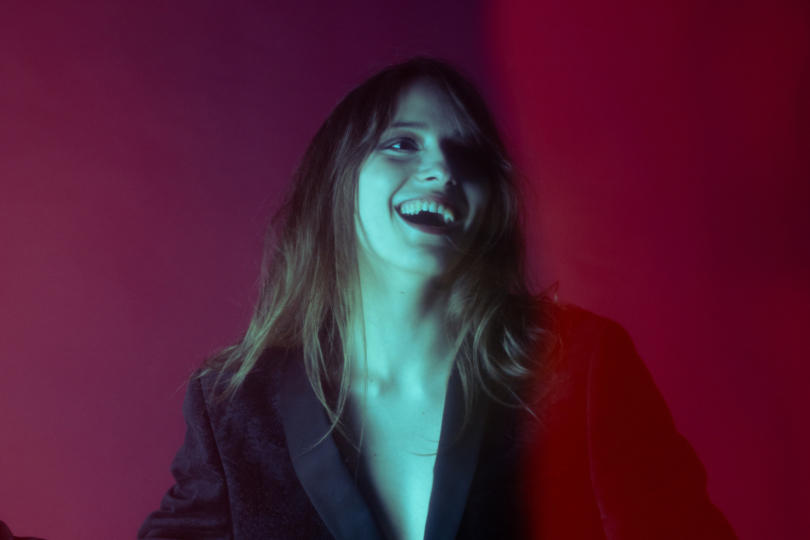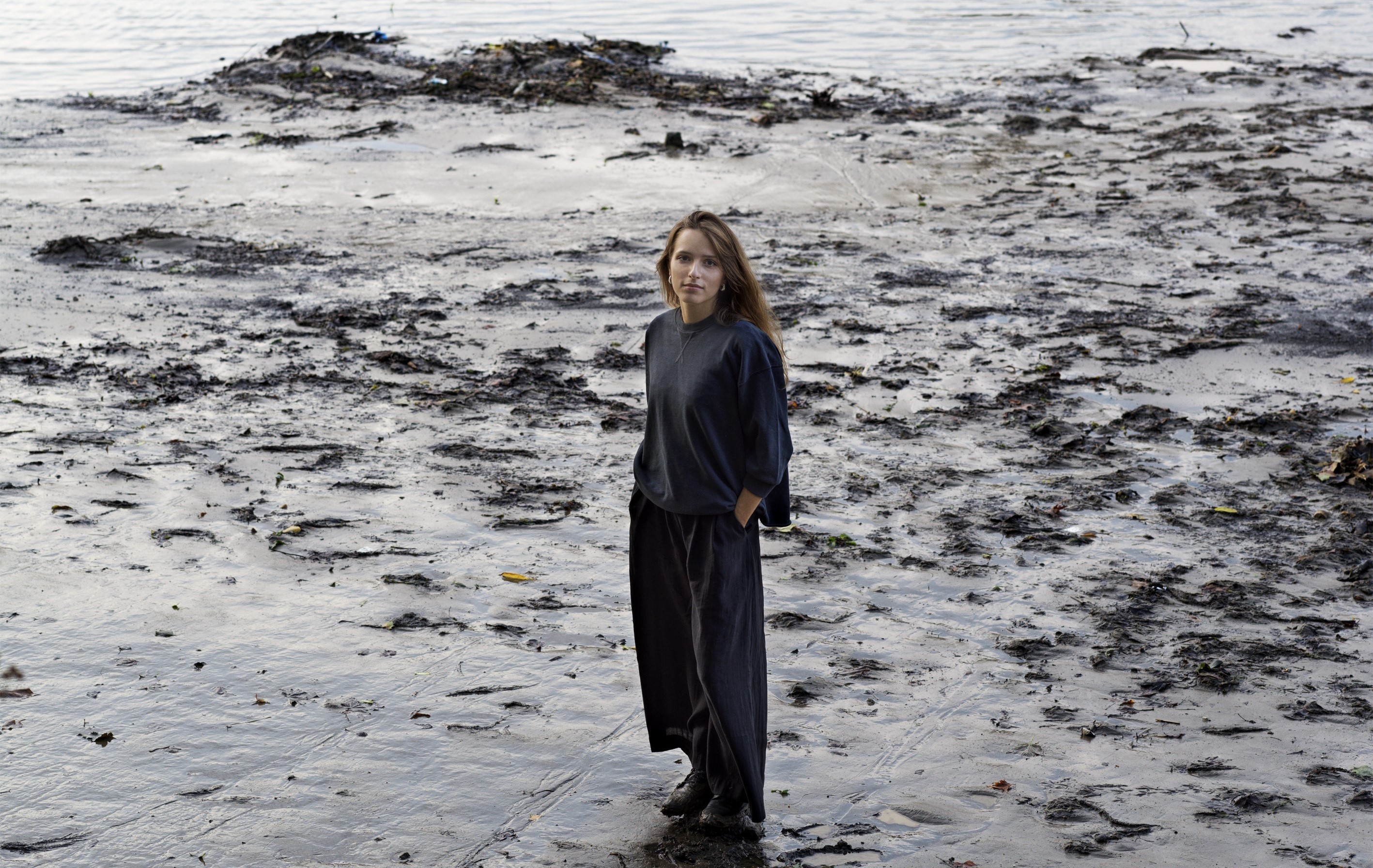
Nina Kohout: I Know There Is So Much More to Create
Composer, singer and producer Nina Kohout was first introduced to Insounder readers after the release of her EP Pandemonium, which was very well received both in her native Slovakia and internationally. This October, she released her debut album Gentle Autopsy, where she further explored her characteristic style, combining dark electronica with elements of classical music and Slovak folk. With Nina, we talked about her creative journey and the themes she explores on the album, but also her life and studies in Brighton and the upcoming CD launch at Prague's Palác Akropolis.
A few weeks ago, your debut album Gentle Autopsy was released. How does it feel, are you happy with the result?
I'm definitely happy with it even though I haven't had the opportunity to process it yet. That's good though, because when you've been working on something for so long, it's very stressful when it suddenly becomes public. But I think that I'm completely on board with the result, I put together the order of the songs at the last minute, so I only listened to the whole album a few times on my way to school and I thought, "Well, it's cool, it will do." (laughs)
Did you have a vision beforehand or was the album created rather organically?
I had to have a vision simply because I was applying for funding and had to specify what the project would be about. I started thinking about it two years ago and that's when the name Gentle Autopsy came up, before all the songs, so I assumed it would be some kind of partially conscious process of autopsy. But the themes that I decided to delve into started to emerge over time.
It feels very natural to me to write from within myself or to reflect on what I'm experiencing. But in addition to that, Gentle Autopsy deals with a lot of broader concepts that aren't completely subjective, and that I'm venturing into for the first time.
You said your debut EP was a frantic chaos, whereas, on this record, you're one step closer to some sense of order and insight. How did the work on your new album differ from your EP, and how do you think the result is different?
It's very different, that EP was a bit heavy-handed, which is partly understandable, as I was going through a personally challenging period back then. Pandemonium was written when I was coming of age and going through some intense times as I had just moved from Slovakia to London. At the same time, I was learning about music production and within the four tracks of the EP, I was trying to find my own style – both in terms of composition and sound. But Gentle Autopsy was written from a very different place in my life, from a much more confident place. Suddenly, it became clearer not only what I wanted to say, but how I wanted to say it.
You collaborated with many musicians from Slovakia and the UK on the album. How did the collaboration work, were they part of the creative process?
Not at all, I didn't let anyone enter the actual creative process. I co-produced a few compositions with Lucas Amsted, my former classmate from The BRIT School, that was maybe closest to some kind of creative activity. I wouldn't say he interfered in the tracks, but he added some sounds, which definitely benefited the final sound. And then with my dad Peter Kohout, who is on two tracks, we wrote his parts together in the studio, which was very inspiring.
What instruments can we hear on the album?
We can hear a clarinet, specifically the bass clarinet played by my father who also plays saxophone and baritone saxophone. Then there are drums, which are played by Irish drummer Hannah Finstra, two different bass players, Miško Pagáč played the violin and I think I recorded the rest of it, there is, for example, the glockenspiel, Rhodes, piano and a lot of synths.
The songs on the album are multi-layered, you use a lot of effects and voices. How do you manage to reproduce that on stage?
With each composition, I try to create a functional live version of the song while preserving most of the sounds that are important to me. I put every detail in knowing that it has its place in the song. On stage, this compromise creates a unique version of the composition which not only makes me explore and do things differently but often we create a new melody line with my father, Peter Kohout, who is my bandmate at the shows. So the songs are based on the original, but they come with some surprises.
On December 4, you will launch the album at Prague's Palác Akropolis. Who will be performing with you there?
Me and my dad, who performs all the shows with me, except in England where we only play together for the bigger shows, like a few weeks ago at Hackney Church in London. At the Acropolis gig, the audience can also look forward to a unique element of this tour – a projection that was made during our residency there. So the projection will be shown on 4 December on the very screen we created it on, which I see as a beautiful full circle moment. I don't think any of the other venues have a screen as big as the Palác Akropolis, so I can't wait to see it there again.
Who collaborated with you on the visualisation?
I worked with a talented Prague-based artist Natálie Portíková. Together we worked out in detail what each song was about, what emotions we wanted to evoke, and we spent months refining it. Graphic designer Jakub Žanony joined the process.
You said that while working on Gentle Autopsy, you discovered musical lightness and at the same time touched on the heaviest topics. What themes do you touch on in the record?
I feel that each song stands on its own feet and apart from the fact that they all share something from within myself, each one speaks of something completely different. For example, there is a theme of motherhood, that is, something beautiful and positive. However, it is linked to the idea that a woman's decision to become a mother should in no way determine her worth or reflect on how affectionate and tender she is as a person. "Little Butterfly" addresses the importance of respecting "no", while "Rhythm of Sirens" reflects on a particular traumatic Monday and represents the fear of losing a loved one. Then, of course, some tracks are explicitly personal, such as "Pebble Dance", a fairytale-like track about a complicated story with a happy ending. The last one, "Traveller", is sort of a healing song.
Your music is often associated with the influence of Slovak folklore. I think it's especially detectable in the vocals in the first track "The Child". How do you relate to folklore and how consciously do you work with it?
Completely subconsciously. For example, the song "The Child" transformed into open throat singing only because it was so sad and had such a funeral, church harmony that I would not be able to sing it in any other way. I was in a folklore ensemble for 10 years, which certainly affected me, but I didn't consciously pursue those references at all; it was purely an artistic decision to make the song more intense and "in your face" rather than too heavy-handed.
I am not particularly interested in folklore, but I'm very interested in working with voice, both as a singer and a listener. Compared to the Pandemonium, on the new album, I allowed myself to explore completely different positions and made my voice the main instrument. This may have been the case before too, but I was more restrained and didn't dare to use such a throaty position at all.

The album also features the track "Caged", on which you collaborated with musician FAYE and Austrian producer Ben Atticy. It was written during a songwriting camp organized by SOZA. How did you get involved and what was it like for you?
They contacted me and I was wondering what to do because I had been very busy that autumn. But I'm glad I accepted, mainly because it made me rethink some of my views on pop and catchiness in music. It allowed me to understand that creating a functional song that is also memorable, of high quality and evokes something interesting is a great art indeed. I hadn't quite been able to appreciate it before, so I really enjoyed it, as well as the actual collaborations. Every collaboration is a search for balance between asserting yourself and listening to others, and I feel that with "Caged", this mutual respect and space worked very well. Given that I'm not at all used to sharing space with other musicians when writing songs, it was incredibly enjoyable to see what the two collaborators brought to the piece. And I think that the song has a specific place on the album as well, like when you have sushi and you spice it up with some ginger, that's what I think "Caged" is.
Two tracks on the album, "Flavoured and Eaten" and "Rhythm of Sirens", stand out a bit, they are faster and more rhythmic, harder. Would you say you've discovered a new direction or approach to songwriting here?
Definitely yes, in my early work, I found it very hard to relate to rhythm and to some kind of rhythmic drive, I couldn't get my head around it, I didn't know how to create or produce a beat. With this album, I said to myself – probably subconsciously, but in hindsight, I can see it – that I wanted to perform stuff that I would genuinely enjoy performing. It's not that I didn't enjoy performing the other songs, but it's really nice, for example, to dance on stage, to convey a completely different vibe. I think the future album might go more in that direction because I love combining experimentation and my own handwriting with something that awakens a whole different energy in the venue. But maybe I'll release a meditation album in the end, who knows?
You live in Brighton now, which is famous for its rich cultural scene. How do you find living there and how does the scene influence you?
It definitely affects me, this is the first time I've been able to compare two different titles and it's hard to say what influences were crucial, to what extent it was a change of city or a new life trajectory. I found a certain lightness in Brighton that I hadn't felt before, certainly due to the proximity of the sea, but also because of what my life has been like for the last two years. It's a great city, compared to London, which I personally didn't really enjoy because it's just mental. There's a community of people in Brighton, it's cultural and at the same time, when I walk around the town, I can say hello to people because we already know each other, in short, it ticks all the boxes and it only took me one night to decide I wanted to live there.
Do you get to see a lot of concerts there?
I used to, but now I play too much, even in Brighton alone I've had like six gigs in the last few months. Things are starting to pick up this year even there, which I'm very happy about, but that said, I don't have much energy to go to other bands' gigs. I'm also still studying and making music for films and TV shows, and combining those three worlds can be quite challenging. But I'm definitely planning to do it because there's so much going on and there is the concept of three bands playing in one night, which is pretty cool. Elsewhere, there are usually just two acts, support and headliner, but there are three or more, so you get to see a small showcase every night.
You're also studying music production at the University of Brighton. How is it going? Would you say it's giving you a lot of creative input?
It's giving me a lot, but unfortunately, I can't focus on it as much as I'd like to because of my career. On the other hand, I think it's great that I'll have somewhere to build from when I leave school. But it's great, the only thing I can compare it to is The BRIT School in London, that was a secondary school and it was free, so it was a completely different concept, but I studied the same thing, music technology, and the level of expertise of those two schools is incomparable. Now I'm in my last year of BA and then I'll see. At the moment, I'm looking forward to graduating and being able to fully concentrate on my work, but I'm not ruling out going back.
How does performing in Slovakia or the Czech Republic differ from the UK? Do you feel that the audience reacts differently to you?
Of course, I am better known in Slovakia than I am in the UK, so it's hard to compare, but I would say in Slovakia I have a bit more comfort, for example in terms of the facilities backstage and the hospitality of the organisers. But again, that's related to the fact I'm more famous at home. At the same time, I had a chance to play quite important gigs in England, for example, we performed at Hackney Church in London, which is a venue. There we opened for a Japanese band called MONO. That was one of the biggest gigs I've ever played, so it's starting to change, I'm starting to see a different side of England.
So it's not mainly underground clubs anymore...
Yes, but I really enjoyed that too, people are very responsive at the concerts there, the Slovaks are more focused, serious and quiet, but at the same time, they might come up to me after the concert crying, so they are also very receptive. The British are paradoxically more spontaneous, maybe it's also because of the English lyrics, there's a certain conversation going on, whereas in Slovakia people don't always know what I'm singing about. Overall, I would say there are no big differences. People are still people, they have similar problems, and there are always those who open up to what I'm saying and others who keep their guard up.
On your EP, there was one song with Slovak lyrics, otherwise, you compose in English. Do you find it easier to write in English or do you want to be more accessible to an international audience?
It is not a calculated choice, I don't feel like I should write in English because of the audience, it's actually more natural to me and I suppose that subconsciously, I feel more enveloped in English than I do in my native language where every word carries an awful lot of weight for me. The topics I talk about are quite heavy and I haven't found the courage to talk about them in any other way than English. And the "Prebúdzanka" is kind of a joke, I rather liked it phonetically. If I were to write a real Slovak song, I would feel that the lyrics have to be perfect, and so far, I haven't felt the need to invest in it.
You said that the album made all your dreams come true and opened a thousand paths to more dreams, which you are already looking forward to. So what are you dreaming about now?
The album was a great teacher for me, it made me think about who I am as an artist. I'm not saying I have the answer, but I think it's quite important to know how you want to use your "voice" in music, both in terms of sound and content. It's through this album, which has challenged me many times, that I've found answers to a lot of those questions. Along with that comes a certain freedom and fascination with what more I can say and how else I want to do it. They say the more you learn, the less you know, and this is similar. With Pandemonium, I felt like I had given it my all and that there was nothing else out there, but after Gentle Autopsy, I know there is so much more to create and communicate.
If you have found an error or typo in the article, please let us know by e-mail info@insounder.org.


